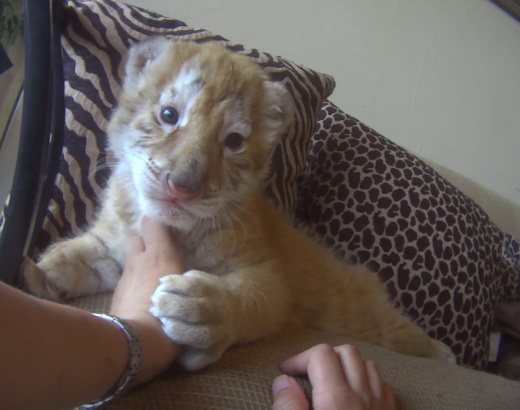A Netflix series on Joe Exotic, who made a living exploiting tigers he held in captivity at his roadside zoo, is helping to mobilize public support in favor of federal legislation that would end such exploitation.
A Washington Post reporter spoke to members of Congress who said they are hearing from constituents eager to pass the Big Cat Public Safety Act after Netflix began airing "Tiger King" last month. The Humane Society Legislative Fund has been a driving force behind this bill, which would ban the possession of big cat species like tigers and lions by individuals without a U.S. Department of Agriculture license and would prohibit public contact with big cats.
The series has raised concerns among those in the animal protection world for glamorizing the bizarre life of Joe Exotic (a.k.a. Joseph Maldonado-Passage), and the Post story says the bill’s backers too wish the documentary had focused less on the man himself and more on the plight of the animals.
However, the office of Rep. Jared Huffman, D-Calif., one of the bill’s sponsors, said it received 181 emails and calls from constituents about the legislation in the first half of April alone — about eight times more than it received during the entire previous month.
“It's not how I would have done it, but I'll take it,” Rep. Mike Quigley, D-Ill., the bill's lead sponsor in the House, told the reporter. “It's a strange thing what gets legislation over the finish line.”
Richard Blumenthal, D-Conn., the lead Senate sponsor of the legislation, said he has “received a lot of feedback, both pro and con, on the series” from constituents.
The HSUS first turned a spotlight on the misdeeds of Joe Exotic with an undercover investigation of his roadside zoo conducted in 2011 where tiger cubs were “trained” by being punched in the face, dragged by leashes and hit with sticks. Sick and injured animals were routinely denied veterinary care. Five tigers died during the four months our investigator spent at the zoo.
Last year, a federal jury found Joe Exotic guilty on charges that included killing five tigers and hiring a hit man to kill the operator of a Florida big cat sanctuary who is a leader in the fight to end private ownership of big cats nationwide. He was sentenced to 22 years in prison.
The people who run roadside zoos would like you to believe that the animals they offer for petting and selfies have a good life with them and are eager for human contact. But in fact, these are wild animals who are abused mercilessly so the public can pet, feed, pose for pictures with and handle the animals. At Joe Exotic’s roadside zoo, it was routine to pull newborn cubs, some just hours old, from their mothers to be hand-raised so they could be readied for handling by the public.
These facilities also claim they are saving tigers—critically endangered in the wild—from extinction, but that is not true. Tigers bred in such facilities are often inbred and suffer from serious congenital defects. Studies also show that substandard exhibits like roadside zoos decrease public awareness about the plight of endangered species in the wild and can be contributors to the illegal trade in wildlife parts.
No wild animal deserves to live in a roadside zoo. If you haven’t already called your lawmakers and asked them to cosponsor the Big Cat Public Safety Act, please do so right now. Practices like cub petting have no place in our modern world, and the sooner we see the last of them the better off the animals will be.
Sara Amundson is president of the Humane Society Legislative Fund.



